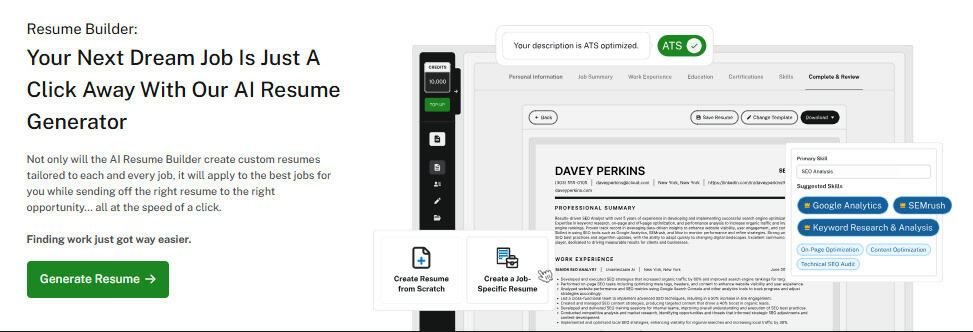Many dream of being real estate agents, considering how lucrative and high-paying this career choice is.
The U.S. Bureau of Labor Statistics projects that real estate jobs will grow by 3% through 2032, as the career path is steadily in demand.
For those eager to become real estate agents, there is a great opportunity for you.
We will walk you through the commitment required to become a real estate agent, obtaining your real estate agent license, and the brokerage joining process.
Basic Requirements to Become a Real Estate Agent
Becoming a real estate agent takes much from you, but it’s worthwhile.
However, there are some fundamental requirements you must meet before you even start applying for jobs at a brokerage.
Brokerages are quite professional and expect the same from you, especially when it comes to your resume.


Never Worry About AI Detecting Your Texts Again. Undetectable AI Can Help You:
- Make your AI assisted writing appear human-like.
- Bypass all major AI detection tools with just one click.
- Use AI safely and confidently in school and work.
This is your first step to impressing them, so it’s best to use our effective and laser-focused Resume Builder to be on the right track.

However, your resume must show you have done the basics below.
Complete a Pre-Licensing Course
Like most high-paying jobs out there, you need to have the prerequisite skills to even start.
Completing a pre-licensing course guarantees that you possess the necessary knowledge of real estate concepts, legislation, and practices, therefore ensuring your eligibility.
Long-term success in the real estate business and passing the licensing test depend on this course.
The course will present to you subjects including property rights, contracts, financing, equitable housing, and ethical business practices.
All of this is to equip you for the future real estate professional you must be, and all you will need to negotiate agreements without running afoul of rules.
For example, you have to finish a 63-hour pre-licensing course certified by the Florida Real Estate Commission (FREC) if you are looking to become a real estate agent in Florida.
Why the Pre-Licensing Course Matters
The pre-licensing course requirement serves several important purposes beyond merely checking a box for licensure eligibility.
- It first lays out a minimum knowledge level that you and every other practitioner have to possess. Real estate transactions carry complicated legal resources, large financial commitments, and strong legal duties. Agents without appropriate training could unintentionally get clients into difficult circumstances.
- The pre-licensing course also exposes you to the vocabulary and ideas you will apply every day in your work. Perhaps most importantly, the course helps protect consumers as real estate agents they interact with must have mastered fundamental knowledge before entering practice. This will reduce the risk of harmful mistakes in transactions involving their homes.
Pass the Real Estate Exam
After the completion of the pre-licensing course, you will then proceed to take a real estate exam in the state you are practicing, thus obtaining your real estate license.
This test gauges your understanding of both national real estate concepts and the particular laws and rules applied in your state.
It takes time and all you can provide. Usually, the test has 100 to 150 multiple-choice questions broken into two sections.
The two sections comprise a national section on broad real estate subjects and a state-oriented piece on local laws, contract law, property management, and assessment.
To be a real estate agent in California, you must register for the exam, complete the course, and sit for a 150-question multiple-choice exam covering national real estate ideas and California-specific legislation.
You have to pass with a minimum of 70%.
These tests cost money and demand payment of a price ranging from $15 to more than $100.
Many candidates decide to take exam prep classes or practice tests, which run between $50 and $125, to avoid failing, so they can pass on the first try.
This is a financial investment and can weigh heavily on you.
You can skip exam prep classes or practice tests and use our AI Chat if your budget doesn’t cover that.

It’ll spare you the hassle, help you one-on-one to practice scenario-based answers, and state-focused real estate questions you need to answer.
The 70% passing threshold might seem steep to reach, but with constant practice and tweaks with the AI chat, you’ll be miles above others.
With great practice and tests, you can take the exam.
Activate Your Real Estate License
Completing the above processes doesn’t mean you’re done. Passing the exam means you’re eligible to apply for a real estate license.
Activating your license means that after your exam, you officially submit your qualifications to your state’s real estate regulatory body for approval.
Once approved, you’re issued a license.
You should also know that there’s a distinct difference between having a license issued and having an active license.
An issued license means the regulatory authority has recognized your qualifications.
What you want is an active license that will authorize you to practice real estate in your state.
In California for instance, once you pass the state exam, you’re allowed to submit a license application to the California Department of Real Estate (DRE).
If you didn’t already apply for your license when you registered for the exam, you can do this through the “RE 435” application, where you fill out the Form RE 202 and send it in.
You also have to submit your fingerprints for a criminal background check. Once everything clears and the DRE gives the green light, you’re officially licensed.
That’s just you being licensed. You now have to activate your license.
In California, you must work under a broker, as new real estate agents cannot operate independently.
You’ll need to work with an established real estate brokerage that will supervise your activities and lead you under the guidance and legal responsibility of experienced brokers.
Therefore, your broker essentially sponsors you and holds your activated license, making you official in the eyes of the law and your clients.
Lastly, states require that you obtain errors and omissions (E&O) insurance before activating your license to protect you against claims of negligence or inadequate work, and many brokerages require it for their agents.
Join a Real Estate Brokerage

A real estate brokerage is a company that sponsors you, trains you, and provides the legal framework for you to operate under with your license.
You can’t be an active real estate agent without a brokerage.
Some big-name brokerages you’ll hear about and might be applying for are Keller Williams, RE/MAX, Coldwell Banker, and Compass.
Still, there are tons of boutique firms too, depending on your goals.
To get your foot into any of these top firms, you need a compelling application letter.
These companies have a high standard for recruiting agents, and you have to do your best with your first pitch.
It’s possible to get their attention with your letter using our Cover Letter Generator, which will tailor your letter to industry standards and sell your skills properly to them.

You must not make the mistake of applying to just one brokerage.
Compare these brokerages and apply to as many as possible to keep your options open, and have a higher chance of getting a call back.
Although this may seem daunting, you can easily accomplish this at once using our smart AI Smart Applier, targeting the brokerages of your choice.

Picking the right brokerage for you out of the hundreds that are out there isn’t just about choosing a big name.
You could look at factors like:
- Training and Mentorship: This is super important if you’re brand new and need to understand how everything works.
- Commission Splits: Consider how much money you get to keep vs. what the broker takes.
- Office Fees: Some brokerages charge desk fees or tech fees monthly.
- Company Culture: What’s the company culture like? Can you work with it?
- Leads and Marketing support: Are you on your own for finding clients, or do you need support?
Some brokers specialize in luxury homes, while others focus on first-time buyers, investors, or even vacation properties.
There are brokerages with different specializations out there. You just have to be sure of your starting point.
The best brokerage, we believe, for you matches your career goal and supports you with the tools you need to succeed in this field.
Check out our AI Detector and Humanizer conveniently in the widget below!
Consider Becoming a REALTOR
One thing you have to grasp is the difference between a REALTOR and a real estate agent.
Simply said, although every REALTOR is a licensed agent, not all real estate agents are REALTORS.
The National Association of REALTORS (NAR) alone uses the term “REALTOR”.
The validity of this association is contingent upon the observance of its rigorous Code of Ethics by members of the association.
The association has approximately 1.5 million members as of 2025, making it one of the largest trade groups in the United States.
Many agents go the extra mile by becoming REALTOR members due to the perks, duties, and career ramifications of this membership.
Becoming a REALTOR is a smart move that can help you advance in your real estate career and get better prospects in the housing market if you’re in it for the long haul.
You can take advantage of many of their programs, as well as discounts on goods and services.
Importantly, you get the chance to network with top REALTORS and use the Multiple Listing Service (MLS).
With the service, you get access to the most recent property listings and provide superior service to your clients.
Continuing Education and Career Growth
Like the pre-licensing course, Continuing Education falls in the same line. As the real estate industry expands, your expertise, compliance, and competitiveness should keep up.
Every renewal cycle, most states mandate licensed agents to finish a specific number of continuing education (CE) hours.
For instance, Florida real estate agents have to complete fourteen hours of CE every two years.
Courses in Florida law, corporate ethics, and specialty areas comprise the CE.
Choose elective courses that fit your interests, as these courses will ensure you stand out in the crowded real estate market.
Being a successful real estate agent means you see education as an investment rather than a requirement.
Your degree will present you with profitable specialties in real estate, such as luxury homes, commercial real estate, property management, or investment research. where professionals often use specialized data sites like propstream.
This opens doors to more commissions, larger client bases, and leadership prospects during your career.
FAQs
How Long Does it Take to Become a Real Estate Agent?
The process might run for four months minimum or six months.
This takes into account the time of pre-licensing course completion (40-180 hours, varying with your state), completing the licensing exam, having your application submitted with a background check, and securing a sponsoring broker.
How rapidly you pass the exam is the largest factor controlling the timeline.
How to Become a Real Estate Agent in California?
First of all, you need to be 18+ and have a 135-hour pre-licensing course approved by the state of California.
Next up, you have to pass the state examination (with a minimum of a 70% passing score), provide fingerprints for a background check, and apply with the California Department of Real Estate for a license.
Once approved, you need to affiliate with a California broker who holds a license before starting a career in real estate.
How to Become a Real Estate Agent in Florida?
Florida requires you to first complete a pre-licensing course for a real estate license; however, for only 63 hours.
Following that, pass the state real estate exam, have your fingerprints checked for a background check, and then apply for a license with the Florida Department of Business and Professional Regulation.
You must be eighteen years old and carry a high school equivalent. Upon approval, you must join a broker who is licensed in the state of Florida.
How to Become a Real Estate Agent in Texas?
Texas needs you to complete 180 hours for the pre-licensing course through five specific courses.
Similar to other states, you’ll have to pass the licensing examination, submit a set of fingerprints for a background check, and submit your application with the Texas Real Estate Commission.
Once that is done, you can go on to affiliate with a sponsoring broker to practice.
Final Thoughts
All in all, becoming a real estate agent in any state is a structured process that any prospective participant has to pass with good grades.
Once you can pass this hurdle, this career field provides you with a sweeping growth trajectory to becoming a REALTOR and a highly paid agent.
As you build your online presence and start marketing yourself, make sure your content stands out.
Undetectable AI can help you create professional, human-sounding content that ranks well and connects with clients—without sounding like it was written by a bot.
